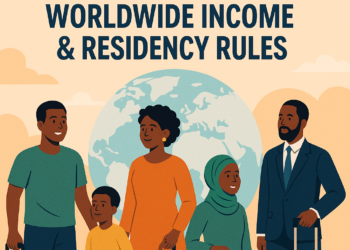Relocating to a foreign country is a significant life decision that demands careful consideration and planning. As a Nigerian contemplating this move, it’s essential to evaluate your reasons, expectations, and the potential challenges you might face.
This article aims to provide valuable insights for those seeking to make the big leap, discussing factors to consider before deciding to move abroad and offering guidance on selecting the best country to relocate to.
First, Should You Relocate?
Self-Reflection: Before embarking on an international journey, take time to reflect on your motives. Are you seeking better economic opportunities, education, safety, or lifestyle changes? Understanding your goals will help you make an informed decision. This is mostly because most of these desires are not exactly the way we have expectation of them abroad.
Research: Thoroughly research the country you’re considering. Learn about its culture, language, job market, healthcare, cost of living, and legal requirements for immigrants. Seek advice from expatriates who have already made the move and gather realistic insights into daily life there. Don’t judge people abroad by only what they say and how they dress or look. Do your own research and compare your discoveries to what you see and hear.
Emotional Preparedness: Relocating comes with its share of challenges, including homesickness, culture shock, and adapting to a new environment. Assess your emotional resilience and determine if you’re ready for these changes. Get ready to be disappointed and be prepared to process this feeling of disappointment when it comes. It will surely come.
Choosing the Right Destination
Job Opportunities and Economic Stability: Select a country that offers opportunities in your field of expertise. Consider the nation’s economic stability, employment rates, and career growth prospects. Look into industries that are thriving and in demand that country.
Quality of Life: Evaluate the quality of life in potential destinations. This encompasses factors like healthcare, education, safety, public services, and overall infrastructure. A nation that offers a high standard of living is likely to provide a better quality of life for you and your family. The aspect of family life and the support you will get from the government and the official policies must be considered. Ask yourself – can I raise my children in this country?
Language and Cultural Fit: Consider your language proficiency and cultural compatibility with the country. Being able to communicate effectively and integrate into the local culture will greatly enhance your experience abroad.
Immigration Policies: Study the immigration policies of your chosen destination. Understand the visa requirements, work permits, and pathways to permanent residency or citizenship. Ensure you comply with legal processes to avoid any issues in the future. Work with professionals where necessary. Avoid hacks.
Conclusion
Relocating to a foreign country is a life-changing decision that requires careful planning and thoughtful consideration. It’s essential to evaluate your motivations, prepare emotionally, and conduct thorough research on potential destinations.
The best country for you to relocate to depends on your individual circumstances, goals, and preferences. Ultimately, a well-informed choice will lead to a smoother transition and a successful new chapter in your life.
Remember, the grass may seem greener on the other side, but it is not always so. Perception is not always reality. However, with the right preparation and mindset, your journey to a new country can be an enriching and rewarding experience.












